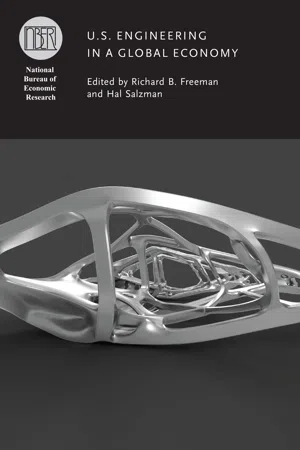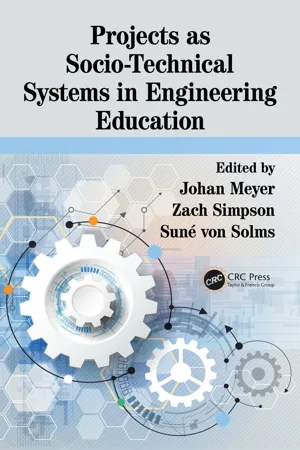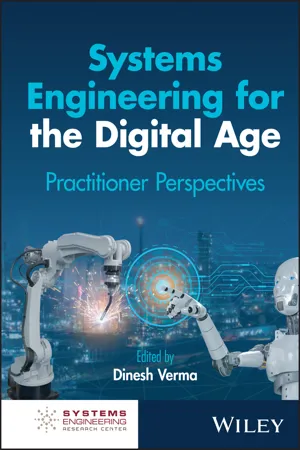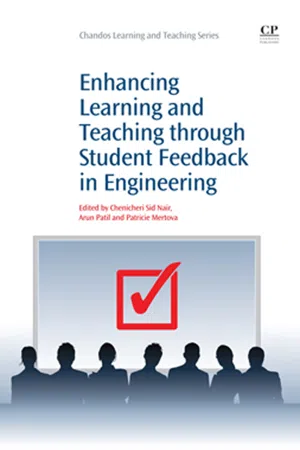Technology & Engineering
Engineering Skills
Engineering skills encompass a range of technical abilities and knowledge required to design, build, and maintain various systems and structures. These skills often include proficiency in mathematics, physics, and computer science, as well as problem-solving, critical thinking, and project management. Engineers use these skills to innovate, create, and improve technology and infrastructure.
Written by Perlego with AI-assistance
Related key terms
1 of 5
5 Key excerpts on "Engineering Skills"
- eBook - ePub
- Richard B. Freeman, Hal Salzman, Richard B. Freeman, Hal Salzman(Authors)
- 2018(Publication Date)
- University of Chicago Press(Publisher)
Table 4.5 shows that participants’ impressions of the general importance of professional knowledge and skills remained relatively constant over time, but the relative importance of technical knowledge and skills declined with twenty fewer mentions after working for four years. Respondent engineers were less likely to mention math, logic, science, problem-solving, and visualization skills as crucial for their work. They were just as likely to mention content knowledge and software skills, and like engineers in the Workplace Sample, provided specific examples of knowledge and applications once in a job. The pattern suggests that engineering students may mistakenly overemphasize the relevance of broad (versus specific) technical knowledge and skills to engineering practice.This supposition is supported by responses that interviewees gave when asked to define engineering as students. Seven described engineering as problem solving, and three explicitly emphasized that engineering entailed the application of math and science.Engineering is the applied use of science and technology to solve problems. (Technical Public Institution, Engineering Physics major, junior year) Engineering is the art of figuring out interesting problems that need to be figured out using math and science. (Suburban Private University, Computer Science major, junior year) Engineering is just coming up with solutions to problems using math and science. (Technical Public Institution, Petroleum Engineering major, junior year)Table 4.5 Comparison of important knowledge and skills (Longitudinal Sample, n = 9)aNumber of participants who reported skill/knowledge as important Junior year of college Four years postgraduation Difference Technical knowledge and skillsa 9 6 −3 Math skills 8 1 −7 Logic skills 5 0 −5 Science skills 4 0 −4 Problem-solving skills 3 2 −1 Technical skills (general) 2 1 −1 Visualization skills 1 0 −1 Content knowledge 2 2 0 Software skills 1 1 0 Total no. mentions 26 6 −20 Professional knowledge and skills 8 7 −1 Context knowledge 3 0 −3 Creativity skills 3 0 −3 Teamwork skills 2 0 −2 Social skills (general) 1 0 −1 Self-directed learning skills 1 1 0 Business knowledge 0 1 +1 Documentation skills 0 1 +1 Self-motivation skills 0 1 +1 Working with people 1 3 +2 Communication skills 2 5 +3 Total no. mentions 13 12 −1 - Johan Meyer, Zach Simpson, Suné von Solms(Authors)
- 2018(Publication Date)
- CRC Press(Publisher)
non-technical competencies to refer to those skills, practices and abilities that are required of engineering professionals but which are not the technical aspects of engineering work. Such competencies are, in fact, not merely complementary; rather, they underpin the practical accomplishment of the technical work of engineering practice. Within this umbrella term, we include, amongst others, communication (verbal and written and formal and informal), leadership and people management, reflection and personal awareness and working in teams (including dealing with diversity). Although there are many other such competencies, these are the only ones addressed in this chapter, both for reasons of space and because they are the ones that emerge most clearly from the data upon which this chapter is based.It can be argued that the broader society most values engineers’ technical skills and competencies. However, within engineering organisations, non-technical competencies are equally valued. There is evidence in the literature to support this assertion. For example, the World Chemical Engineering Council (2004) lists the most important abilities of engineering graduates, from the perspective of employers, as teamwork, effective communication, self-learning and the ability to gather and analyse information. Similarly, Dannels (2002) finds that engineering industry professionals rate effective communication as the second most important competency, after problem-solving.In this chapter, we report on gains in non-technical competencies made by engineering students deployed as mentors within a project aimed at connecting the public to free Wi-Fi services offered by the City of Johannesburg. This project is described in detail before students’ development in terms of the various non-technical competencies is addressed. First, however, we discuss these competencies in relation to their positioning within the student outcomes defined by the American Accreditation Board for Engineering and Technology (ABET) and the prescribed programme exit-level outcomes (ELOs) defined by the Engineering Council of South Africa (ECSA).- eBook - PDF
Systems Engineering for the Digital Age
Practitioner Perspectives
- Dinesh Verma, Dinesh C. Verma(Authors)
- 2023(Publication Date)
- Wiley(Publisher)
This pattern recognition is a critical way systems engineers provide value. ● Interpersonal skills: Systems engineering is by definition team-based activity with a clear social context. For systems engineers to be effective, they must have the ability to work within teams. Communication skills are a critical aspect of this – and these skills are diverse. Systems engineers must be able to share information efficiently in verbal or written formats and due to the transdisciplinary role they play, presentation skills are also critical. Another way systems engineers provide value is by applying their understanding of a team’s skills and competencies to the problems at hand. One way this manifests is by being a resource who may not be able to solve all the problems but knows the right people to bring together to solve problems. ● Technical leadership: Systems engineers often have a leadership role on teams, whether for- mally or informally. In order to provide critical values such as leading teams toward a consistent system vision or making balanced decisions or taking rational risks at the systems level, systems Understanding Critical Skills for Systems Engineers 810 engineers must have foundational leadership abilities that they can apply in the context of their technical tasks. A critical way systems engineers provide value in leadership roles is through conflict resolution and barrier-breaking – bringing their systems mindset skills forward to help a team come together to solve complex problems. Let’s come back to the context of T- or Pi-shaped skills. It should be easy to see that many aspects of sys- tems engineering are cross-cutting. Technical leader- ship, interpersonal, and systems mindset skills all enable a systems engineer to span the boundaries of disciplines, domains, and even culture. - Chenicheri Sid Nair, Arun Patil, Patricie Mertova(Authors)
- 2012(Publication Date)
- Chandos Publishing(Publisher)
On the other hand, soft skills are not that easy to define. Soft skills such as leadership, negotiating, listening and conflict mediating are as important as hard skills for today's global workforce (Smith, 2010). The importance of soft skills There is no doubt that hard skills are essential to perform an engineering job competently and efficiently. A blend of both is needed for professional success as an engineer (Hannon, 2003). Ethaiya and Mangala (2010) argue that soft skills are learned behaviours which enable all students with a strong conceptual and practical framework to build and develop their overall personality and enhance their career prospects (see Figure 4.1). They determine an engineer's attitude towards his/her work, organisation, clients and colleagues. Soft skills are not just limited to the professional workplace, but the need for them also extends to other spheres of life, for example society and family. These skills are not just about communicating, but include the ability to manage stress, to organise and to provide solutions. Most of the time the importance of soft skills is ignored, and is not given adequate attention by engineers while developing their technical or hard skills. Engineering education in India often does not concentrate on these essential soft skills. The curriculum tends to ignore the fact that an engineer will be working in a team, reporting to someone else, writing reports, dealing with work pressures, giving presentations, etc. In all such situations, along with technical skills, an individual's experience and maturity tend to play an important role (Hannon, 2003; Ethaiya and Mangala, 2010). Although there is consistent evidence in the literature of the need for both soft and hard skills in engineering education, there is little in terms of understanding the student experience in terms of the learning skills they believe they need for their future employment in India- eBook - ePub
Transnational Competence
Empowering Curriculums for Horizon-rising Challenges
- Peter H. Koehn, James N. Rosenau(Authors)
- 2015(Publication Date)
- Routledge(Publisher)
22Technical analytic skills include the ability to identify and formulate a wide range of engineering problems and the ability “to design a system, component, or process to meet desired needs within realistic constraints such as economic, environmental, social, political, ethical, health and safety, manufacturability, and sustainability. ”23 Learning to accommodate “changes demanded by evolving technologies”24 is a critical aspect of the technical curriculum. Reducing size, complexity, and “choke points” is a concomitant emphasis.25
Index pages curate the most relevant extracts from our library of academic textbooks. They’ve been created using an in-house natural language model (NLM), each adding context and meaning to key research topics.




